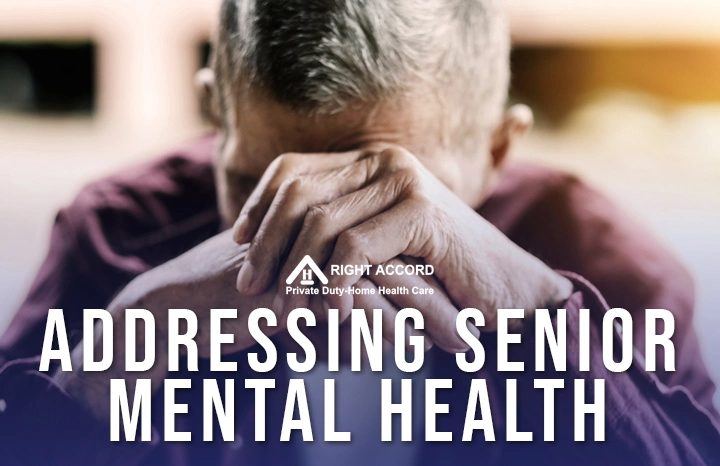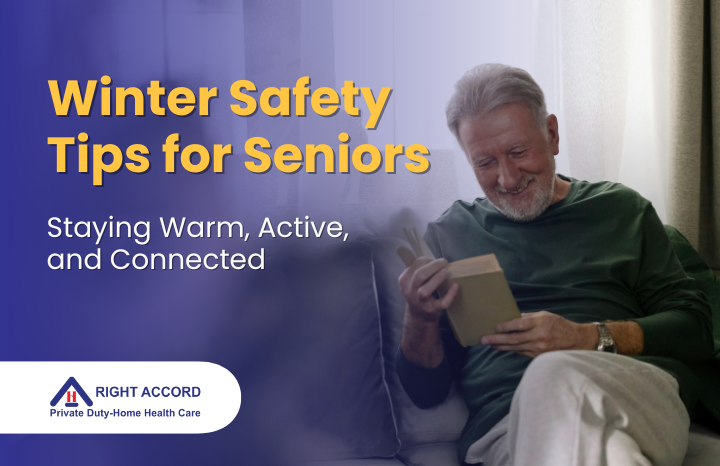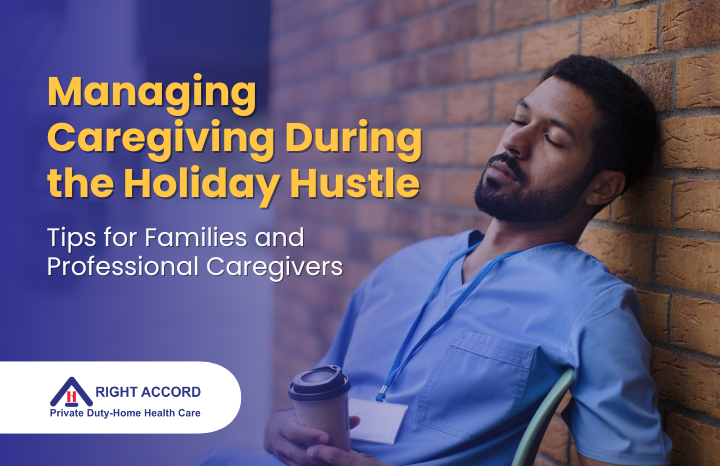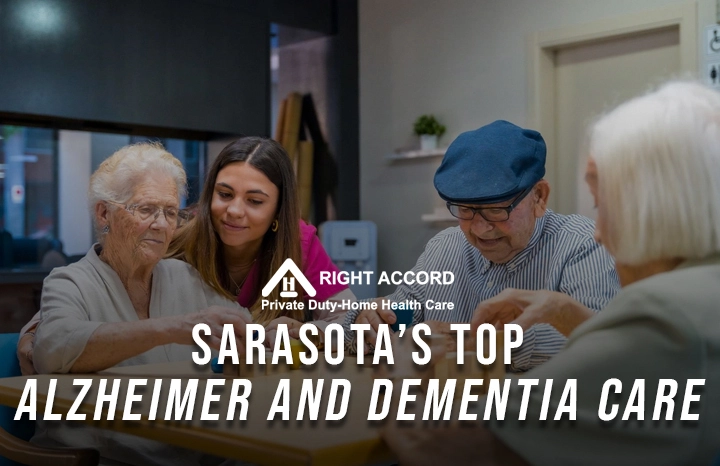· 7 min read
Are You Addressing Senior Mental Health After a Disaster?
Natural disasters, such as hurricanes, wildfires, and floods, can leave behind far more than just physical damage.

By: Rosemarie Tamunday Casanova — RN, BSN, MHA
For seniors, who may already face health challenges, limited mobility, or social isolation, the emotional and mental toll of such events can be even greater. Family members and caregivers play an essential role in ensuring seniors not only recover physically but also receive the emotional support they need to navigate the trauma and aftermath of a disaster. In this blog, we’ll explore the emotional impact of natural disasters on seniors, the signs to watch for, and actionable steps families and caregivers can take to support their elderly loved ones in the recovery process.
The Emotional Impact of Natural Disasters on Seniors
The emotional aftermath of a natural disaster can be particularly intense for seniors, for whom such events may trigger feelings of helplessness, anxiety, and grief. According to experts, seniors are among the most vulnerable to experiencing mental health issues following traumatic events . Here’s why:
- Loss of Independence: A natural disaster can disrupt a senior’s daily routine, leading to the loss of personal autonomy. When homes are damaged or healthcare services are interrupted, many seniors feel a loss of control, which can lead to increased anxiety and depression.
- Cognitive Decline: Some seniors may already be experiencing cognitive challenges, such as dementia or Alzheimer’s disease. The chaos and upheaval caused by a disaster can exacerbate confusion and disorientation Collier Home Care.
- Displacement and Isolation: If evacuation is necessary, seniors may be separated from familiar surroundings and loved ones. Being away from their homes, communities, and routines can amplify feelings of isolation, especially for those who live alone. Physical Vulnerability: With limited mobility or existing health issues, seniors may not be able to evacuate quickly or access necessary medical care during and after a disaster. This can increase feelings of fear and helplessness, which may evolve into lasting psychological distress.
Recognizing Signs of Emotional Distress in Seniors
Family members, caregivers, and even seniors themselves should be vigilant about recognizing the signs of emotional distress after a natural disaster. These signs may not always be obvious and can sometimes be mistaken for normal aging or medical issues. Here are some indicators that a senior may need emotional support:
- Increased Anxiety: Seniors may become excessively worried about future disasters, often feeling anxious about the safety of their loved ones, their homes, or their belongings. Watch for changes in their behavior, such as constantly checking the weather or obsessively worrying about worst-case scenarios.
- Withdrawal from Social Interaction: If your elderly loved one seems to be withdrawing from social activities, refusing to talk, or avoiding visits from family and friends, they may be experiencing depression or anxiety. Isolation is a common reaction when seniors are feeling overwhelmed.
- Sleep Disturbances: Difficulty sleeping, nightmares, or frequent waking can be signs that a senior is struggling emotionally. They may be replaying the traumatic event in their mind or experiencing fear about the possibility of another disaster.
- Physical Symptoms: Emotional distress in seniors can manifest physically through headaches, unexplained pain, digestive issues, or fatigue. These symptoms may be mistaken for other medical conditions but could be directly related to their emotional state Advocate.
- Confusion or Cognitive Decline: For seniors with dementia or cognitive impairments, the stress of a disaster can cause significant setbacks in their mental state. Family members and caregivers may notice increased confusion, forgetfulness, or agitation.
How Family Members Can Support Seniors Emotionally After a Disaster
As a family member, it’s essential to provide emotional support to your elderly loved ones after a natural disaster. You can help them rebuild not only their homes but also their emotional well-being. Here are some ways to offer support:
- Open Communication. Make space for open and honest conversations. Allow your loved one to express their feelings, fears, and frustrations without judgment. This can provide them with a sense of relief and validation. Be patient and let them talk at their own pace. Simply knowing that someone is there to listen can help ease their anxiety and sadness.
- Re-establish Routine. Seniors often rely on routines to maintain a sense of normalcy. Helping them return to familiar activities, whether it’s a morning walk or a daily call with family, can provide a comforting sense of control. Reintroducing daily rituals can greatly reduce their stress levels and make the post-disaster recovery process smoother.
- Encourage Social Engagement. Isolation can deepen feelings of depression. Encourage your elderly loved one to reconnect with friends, neighbors, or senior groups. Even virtual check-ins via phone or video calls can help them feel less alone. If they’ve been displaced, help them get involved with community centers or support groups where they can connect with others in similar situations.
- Address Practical Concerns. Many seniors worry about practical issues such as home repairs, medical supplies, and insurance claims after a disaster. Helping them manage these concerns can reduce stress and allow them to focus on emotional healing. Ensure that their home is safe, their healthcare needs are met, and that any financial or legal issues are being addressed.
- Provide Reassurance. Fear of future disasters is common after a traumatic event. Reassure your loved one that steps are being taken to ensure their safety moving forward. Talk about the emergency plan that’s now in place, and make sure they feel confident that they won’t be left alone in the event of another disaster.
How Caregivers Can Provide Emotional Support
Caregivers, whether professional aides or family members, play an instrumental role in helping seniors recover from the emotional impact of a natural disaster. Here are some key strategies caregivers can use:
- Be Attentive to Changes in Behavior. Caregivers should remain vigilant for any changes in a senior’s behavior, mood, or health. Early recognition of emotional distress can lead to quicker interventions. Keep track of their emotional health as part of your caregiving routine, just as you would with physical health concerns WUSF.
- Offer Comfort and Companionship. Sometimes, seniors need more than practical support; they need to feel emotionally connected and cared for. Simple acts like offering a hand to hold, a listening ear, or sharing a cup of tea can help them feel less anxious and more supported during challenging times.
- Assist with Access to Professional Help. If a senior is exhibiting significant signs of depression, anxiety, or trauma, it’s essential to seek professional help. Caregivers can assist by helping to coordinate counseling services or psychiatric care if needed. Many seniors benefit from working with a therapist who specializes in trauma or geriatric mental health Senior Safety Advice.
Self-Care for Caregivers
Caring for a senior in the aftermath of a disaster can be emotionally draining for caregivers as well. Be sure to take time for self-care. Joining support groups for caregivers or talking to a counselor can help you manage your own stress. Remember, taking care of your emotional well-being is essential to providing the best care possible for your loved one.
The Importance of Professional Support
Seniors recovering from a natural disaster may require more than just emotional support. Professional caregivers can provide invaluable assistance, ensuring that seniors’ physical, emotional, and mental health needs are met. At RIGHT ACCORD Home Health Care, we specialize in providing personalized care to seniors during challenging times like these. Our team is equipped to handle both the physical and emotional recovery process, ensuring seniors feel supported and safe as they rebuild their lives after a disaster.
Conclusion
Natural disasters can leave a lasting emotional imprint on seniors. As family members and caregivers, it’s crucial to recognize the signs of distress and provide the emotional support they need to heal. By staying connected, offering reassurance, and seeking professional help when necessary, you can help your elderly loved ones regain their sense of stability and well-being. If you or a senior you love needs support during the recovery process, call RIGHT ACCORD Home Health Care at 941-366-0801 or visit our website at www.rightaccordhealth.com to schedule your free in-home assessment. We proudly serve Sarasota, Venice, and Manatee Counties in Florida. Our compassionate caregivers are here to help your loved ones through every stage of recovery, ensuring their physical and emotional well-being.



